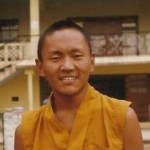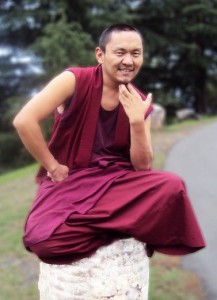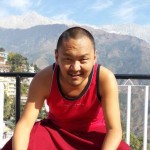
 I became a monk with my enthusiastic heart when I was very young and spent eight years in my monastery in Tibet. In fact, I couldn’t study Buddhism there as well as I would have liked, but I did learn some knowledge of rituals. Of course, my parents didn’t want me to go to India because of the great difficulties of the journey, but I was not satisfied with what I was doing in my daily life in Tibet. I wanted my dream of learning Buddhism to come true, and to look at my own life from a different perspective, with enthusiasm, not just seeking something for wisdom. Only because of that reason I could leave everything, my beloved parents, friends, and all of my desirable things behind me.
I became a monk with my enthusiastic heart when I was very young and spent eight years in my monastery in Tibet. In fact, I couldn’t study Buddhism there as well as I would have liked, but I did learn some knowledge of rituals. Of course, my parents didn’t want me to go to India because of the great difficulties of the journey, but I was not satisfied with what I was doing in my daily life in Tibet. I wanted my dream of learning Buddhism to come true, and to look at my own life from a different perspective, with enthusiasm, not just seeking something for wisdom. Only because of that reason I could leave everything, my beloved parents, friends, and all of my desirable things behind me.
 I’ve been fortunate to find a way of life that I love very much since I escaped from Tibet. Now it has been 17 years, and during this period of time I was able to go to three different schools and see many great thinkers and wonderful spiritual teachers including His Holiness the Dalai Lama. And I had a great opportunity to learn languages – both Tibetan and English – as well as Buddhist philosophy, Buddhist science, and western philosophy.
I’ve been fortunate to find a way of life that I love very much since I escaped from Tibet. Now it has been 17 years, and during this period of time I was able to go to three different schools and see many great thinkers and wonderful spiritual teachers including His Holiness the Dalai Lama. And I had a great opportunity to learn languages – both Tibetan and English – as well as Buddhist philosophy, Buddhist science, and western philosophy.
Many people say that the reason why we should have an education is because our life contains three points: education; life and death. But I don’t regard education as a preparation for life. To use the words of the American philosopher John Dewey, education is life itself!
Everything in life is temporary. I am not saying that life is suffering and has no meaning. Your life depends solely on you. It can be meaningful if you bring philosophy to it. Philosophy has so many fields to be understood, but here I am talking about the philosophy of our own lives. I think that if you have no philosophy or view on your own life then then there will not be any great joy in it.
And then the Buddhist point of view tells us that all the sufferings are made by our ignorance. What is ignorance ?
The Sanskrit word for ignorance or confusion is avidya, which literally means “not knowing”. There are several interpretations of what is meant by avidya according to different philosophical schools and that is why there are many explainations about truth. I think the point it that we should know the gap between how things appear and what is reality. All Buddhist philosophy rests on an understanding of this basic truth.
 My philosophical background is rooted in the Buddhist point of view but I try look at western philosophy as well. There are so many similarities between both eastern and western philosophy in the fields of reality, idealism, materialism, skepticism and empiricism – and so on.
My philosophical background is rooted in the Buddhist point of view but I try look at western philosophy as well. There are so many similarities between both eastern and western philosophy in the fields of reality, idealism, materialism, skepticism and empiricism – and so on.
Because of my interest in western philosophy I want to help make it accessible to my Tibetan friends and colleagues. I recently translated one of the chapters by the British philosopher Bertrand Russell on idealism (Problems of Philosophy) and there are many interesting things there that we can share. So I really recommend that you read them!





 Print
Print Email
Email













